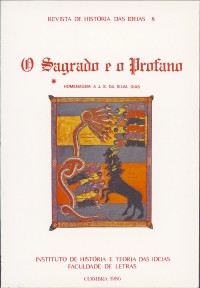Please use this identifier to cite or link to this item:
https://hdl.handle.net/10316.2/45270| DC Field | Value | Language |
|---|---|---|
| dc.contributor.author | Fonseca, Carlos da | - |
| dc.date.accessioned | 2019-02-05T10:36:05Z | |
| dc.date.accessioned | 2020-09-30T23:26:36Z | - |
| dc.date.available | 2019-02-05T10:36:05Z | |
| dc.date.available | 2020-09-30T23:26:36Z | - |
| dc.date.issued | 1986 | - |
| dc.identifier.issn | 0870-0958 | - |
| dc.identifier.issn | 2183-8925 (digital) | - |
| dc.identifier.uri | https://hdl.handle.net/10316.2/45270 | - |
| dc.description.abstract | Bread, the basic element of the Portuguese dietetic system, has always been the object of discord between the consummer body and the governments, between the lower classes and the speculating industrials. In catholic Portugal, these conflicts are even stronger because bread has always symbolized the body of Christ and it has maintained the magical and religious aura of ancient Greek and Roman beliefs. | eng |
| dc.language.iso | por | - |
| dc.publisher | Imprensa da Universidade de Coimbra | - |
| dc.rights | open access | - |
| dc.title | Do pão de Deus ao pão que o Diabo amassou | por |
| dc.type | article | - |
| uc.publication.collection | Revista de História das Ideias vol. 8, Tomo I | - |
| uc.publication.firstPage | 263 | - |
| uc.publication.lastPage | 279 | - |
| uc.publication.location | Coimbra | - |
| uc.publication.journalTitle | Revista de História das Ideias | - |
| uc.publication.volume | 8, Tomo I | por |
| dc.identifier.doi | 10.14195/2183-8925_8-1_10 | - |
| uc.publication.section | I | - |
| uc.publication.orderno | 12 | - |
| uc.publication.area | Artes e Humanidades | - |
| uc.publication.manifest | https://dl.uc.pt/json/iiif/10316.2/45270/250767/manifest?manifest=/json/iiif/10316.2/45270/250767/manifest | - |
| uc.publication.thumbnail | https://dl.uc.pt/retrieve/11912553 | - |
| item.grantfulltext | open | - |
| item.fulltext | With Fulltext | - |
| Appears in Collections: | Revista de História das Ideias | |
Files in This Item:
| File | Description | Size | Format | |
|---|---|---|---|---|
| do_pao_de_deus.pdf | 398.39 kB | Adobe PDF |  |
Items in DSpace are protected by copyright, with all rights reserved, unless otherwise indicated.
